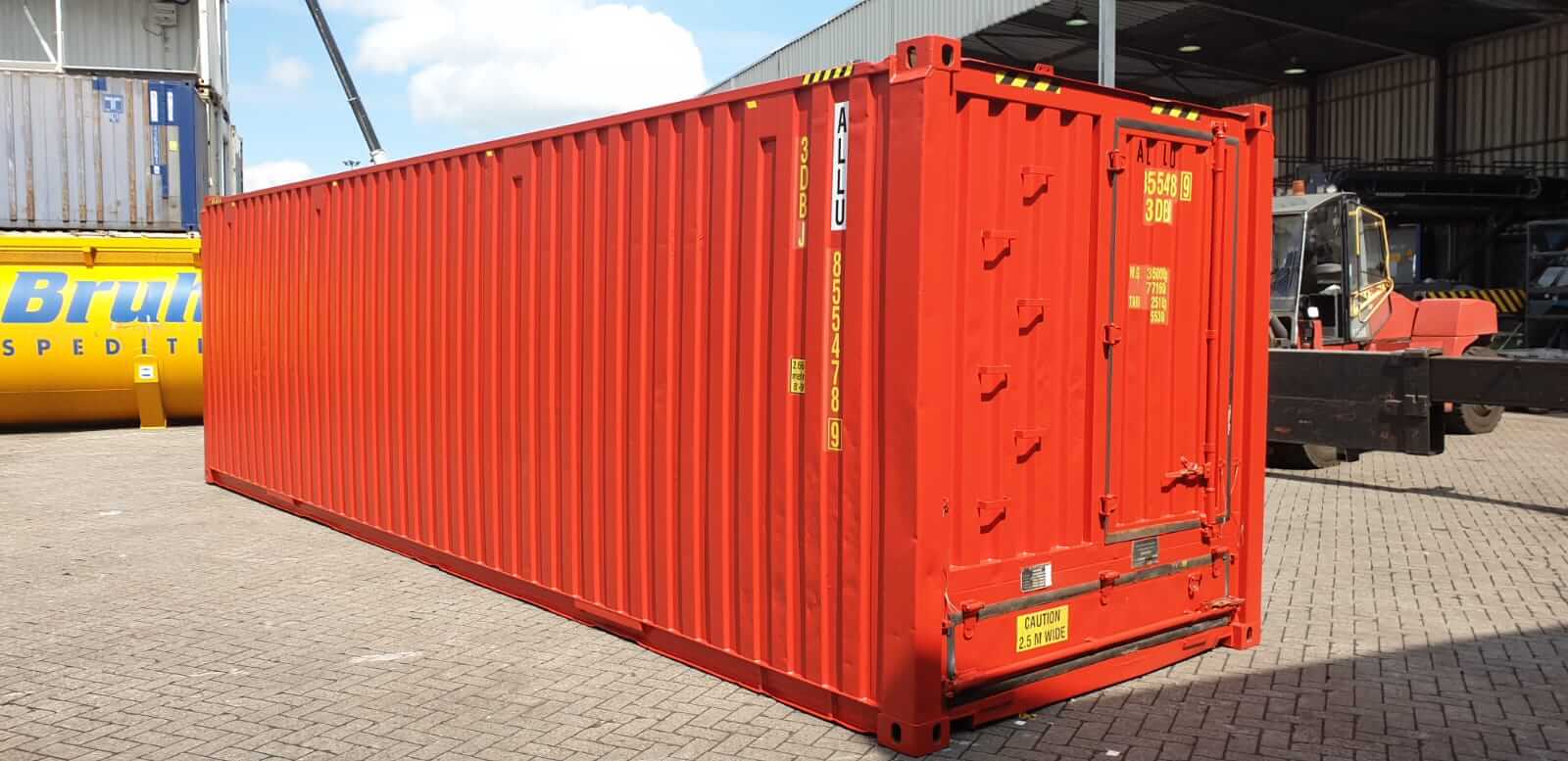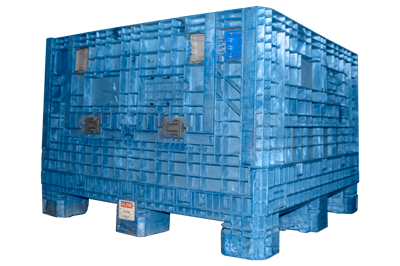The Ultimate Overview to Picking the Right Bulk Containers for Your Organization Demands
Choosing the suitable bulk containers is crucial for any organization that relies on effective logistics. Various types of containers exist, each developed for certain materials and applications. Variables such as dimension, material compatibility, and regulatory requirements play a substantial duty in this decision-making process. Recognizing these elements can lead to enhanced functional performance. Nonetheless, numerous services ignore necessary aspects that can enhance their overall efficiency and sustainability. What are these considerations?
Understanding Various Sorts Of Mass Containers
Bulk containers work as important tools for businesses seeking efficient storage and transportation remedies. These containers are available in different kinds, each designed to satisfy particular operational requirements. One common kind is the intermediate mass container (IBC), which is excellent for granulated and fluid materials, offering a balance of capability and ability to move. Another prominent alternative is the mass bag, or FIBC, ideal for completely dry, flowable products. These versatile containers are light-weight and can be conveniently carried and kept. For larger materials, stiff bulk containers are commonly used, giving longevity and security for risk-free handling. Additionally, there are customized containers tailored for hazardous materials, ensuring conformity with safety and security laws. Comprehending the distinctive qualities of these mass container kinds allows services to make informed decisions that enhance logistics and decrease prices. By choosing the ideal container, business can improve their operational performance and simplify their supply chain processes.
Key Product Considerations for Bulk Containers
When selecting bulk containers, it is important to consider the materials utilized in their construction. Elements such as stamina, toughness, and chemical compatibility play an important role in making certain the containers fulfill particular operational needs. Additionally, weight and mobility worries can affect both performance and transportation logistics.
Product Sturdiness and Toughness
Longevity and stamina are important elements in picking materials for bulk containers, as they straight affect the container's capability to endure different ecological conditions and dealing with procedures. Products such as high-density polyethylene (HDPE), polypropylene, and stainless steel are commonly preferred for their durable properties, providing resistance to effect, temperature level, and abrasion changes. The selection of material also impacts the total life-span of the container; stronger materials usually lead to much less regular substitutes, resulting in set you back savings over time. Additionally, the weight of the product can affect delivery expenses and simplicity of handling. Organizations must consider their particular functional atmospheres and the potential for damage to ensure peak longevity and toughness in their mass container choice.
Chemical Compatibility Aspects
Comprehending chemical compatibility is important for selecting bulk containers, as the products made use of must withstand the details compounds they will hold. Different factors influence compatibility, including the chemical nature of the materials, temperature level, and duration of storage. Corrosive chemicals may require containers made from stainless steel or specialized plastics that stand up to destruction. Furthermore, reactive substances can create heat or gases, demanding vented or pressure-rated containers. The choice of container product, whether polyethylene, metal, or polycarbonate, should line up with the chemical residential or commercial properties of the kept compounds to stop leaks or violations. Inevitably, an extensive analysis of these compatibility factors ensures risk-free handling and storage, securing both workers and the setting while keeping product stability.
Weight and Transportability Worries
Selecting bulk containers entails not only evaluating chemical compatibility but likewise taking into consideration weight and mobility. Businesses need to assess the ease of handling and transportation to maximize performance. Light-weight materials like high-density polyethylene (HDPE) or aluminum can help with simpler activity and lower delivery expenses. On the other hand, heavier containers may offer improved longevity but can prevent flexibility, particularly in settings requiring regular relocation. Furthermore, the layout of the container must enable convenient training and piling, guaranteeing ergonomic safety and security for employees. Companies need to additionally consider the facilities offered for transportation; as an example, containers compatible with forklifts or pallet jacks can enhance operations. Inevitably, the best equilibrium between weight and portability straight affects operational effectiveness and cost performance.
Sizing Your Bulk Containers for Optimum Performance
When sizing bulk containers, services have to very carefully evaluate the dimensions called for to fit their particular items. In addition, weight capacity is a critical factor that affects performance and safety throughout transport and storage. Reliable sizing not only maximizes area however additionally enhances functional process.
Figuring Out Container Capacities
Selecting the ideal dimensions for mass containers is important for optimizing efficiency in storage and transport. Services have to evaluate their particular demands, thinking about elements such as readily available room, the nature of the items being stored, and the approaches of transportation utilized. Precise measurements guarantee that containers fit ideally in lorries and storehouses, lessening squandered room and lowering dealing with time. Criterion dimensions can offer convenience, but personalized dimensions may be essential for unique demands or to suit details products. Furthermore, it is necessary to review stacking abilities and ease of access, as these elements influence general operational efficiency. Ultimately, the appropriate measurements cause boosted company and structured logistics, benefiting the overall efficiency of the business.
Weight Ability Considerations
Comprehending weight capability is essential for companies intending to optimize their mass container efficiency. The weight capacity of a container directly impacts storage abilities, transport logistics, and overall functional prices. Picking containers with the proper weight limits assures that companies can securely store and carry their items without running the risk of damage or conformity problems. Overwhelming containers can bring about structural failings, while underutilizing capacity results in lost sources. When selecting containers, it is vital for companies to examine their item weights and consider any type of governing needs. In addition, variables such as the sort of material, planned use, and ecological conditions must also affect weight capability decisions. website By examining these components, organizations can enhance efficiency and ensure a streamlined supply chain.
Governing Compliance and Safety And Security Standards

Regulative conformity and safety requirements play a necessary function in the choice of bulk containers for businesses. Organizations has to guarantee that their containers fulfill numerous guidelines set by neighborhood, national, and global authorities. These standards frequently refer to material security, structural honesty, and appropriate labeling, which help stop mishaps and ensure the secure transportation of goods.
Furthermore, adherence to industry-specific guidelines, such as those from the Food and Drug Administration (FDA) or the Occupational Safety and Health Management (OSHA), is vital for firms taking care of harmful materials or foodstuff. Non-compliance can cause penalties, lawful issues, or damage to an organization's credibility.
Services need to likewise take into consideration the container's compatibility with the products being kept or carried to stay clear of contamination or chemical responses (used bulk containers). To sum up, comprehending and applying governing compliance and safety standards is vital for the accountable and efficient use mass containers
Sustainability Alternatives for Eco-Friendly Bulk Containers

Firms are additionally discovering options made from recycled materials, which not only save resources however also sustain the recycling market. Developments in design permit for lighter containers that call for much less power to transport, further boosting sustainability. By integrating these environment-friendly mass container choices, businesses can demonstrate their commitment to ecological stewardship while meeting customer need for lasting practices. This change not only helps the earth however can also boost brand name credibility and consumer commitment.
Cost-Effectiveness and Budgeting for Mass Containers
While several services concentrate on sustainability, cost-effectiveness stays an essential element when selecting mass containers. Organizations needs to examine the preliminary purchase price, as well as long-term operational costs, to ensure monetary stability. Variables such as reusability, longevity, and maintenance play a significant role in determining overall costs.
Buying top quality containers might yield greater in advance costs but can cause financial savings via lowered substitute prices and decreased waste. Furthermore, companies need to take into consideration transport prices and storage performance, as these can affect the overall spending plan.

Often Asked Questions
Exactly how Do I Figure Out the Right Container for Hazardous Materials?
To figure out the appropriate container for harmful products, one need to assess compatibility with the material, consider the container's material, check for regulatory compliance, and evaluate capacity and security features to ensure proper handling and storage space.
Can Bulk Containers Be Custom-made for Certain Products?
Yes, bulk containers can be customized for certain items. refurbished bulk containers. Numerous features, such as material, size, and layout, can be tailored to meet special requirements, guaranteeing optimal safety and effectiveness for carrying and storing different products
What Is the Average Life Expectancy of Different Bulk Container Kind?
The typical life-span of bulk container types varies; plastic containers last 5-10 years, metal containers 10-20 years, and wood containers commonly last 3-7 years, depending upon usage, maintenance, and environmental conditions.
Just how Should I Tidy and Maintain Bulk Containers?
To clean up and preserve bulk containers, one should frequently examine for damage, get rid of deposit, clean with suitable detergents, wash completely, and warranty appropriate drying out prior to storage. Adhering to producer standards boosts longevity and security throughout use.
Exist Rental Choices for Mass Containers Available?
Yes, various companies use rental choices for mass containers, offering flexibility for businesses. These services can fit different requirements, permitting companies to take care of supply efficiently without the dedication of purchasing containers outright.
Toughness and strength are important elements in choosing products for mass containers, as they straight influence the container's capacity to withstand various environmental problems and dealing with processes. Understanding chemical compatibility is essential for choosing mass containers, as the materials made use of must withstand the certain compounds they will certainly hold. Comprehending weight capacity is essential for businesses intending to enhance their bulk container performance. Regulatory conformity and safety standards play an essential role in the option of mass containers for businesses. While lots of services concentrate on sustainability, cost-effectiveness continues to be an important factor when choosing bulk containers.